You know those unpleasant times in life, such medical issues, the loss of a loved one, or a parade of rotten luck?
Of course you do, and we’re guessing you went on with life anyway, determined to not let circumstances Break You. But when a minor setback occurs, such as misplacing keys or spilling a cup of coffee, you burst into tears.
Raise your hand if you can relate.
In the 1942 war drama, Reunion in France, there is a poignant scene in a Parisian dress shop that beautifully portrays this feeling of helpless frustration. The scene takes place shortly after the German army occupies Paris in 1940.
Joan Crawford plays a wealthy, self-absorbed Parisian who is unexpectedly subject to German occupation. So, when she visits the aforementioned dress shop – a place where she has spent a lot of money – and begs for a job, one of the sales women starts to cry.
Sales Woman: “Imagine, after all that’s happened, I would cry at this.”
Boss: “Because we can understand it. Who can expect a woman to cry because an empire’s collapsed?”
This scene is one of many in Reunion in France that, for us, sets this film apart as a unique WWII drama. It’s an examination of military occupation from a woman’s point of view, and how women survive it.
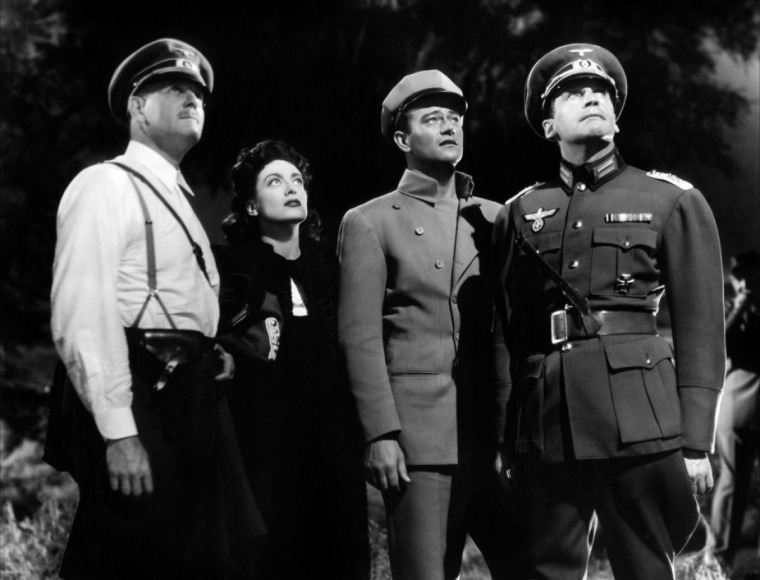
Crawford and John Wayne (second from right) hope for a miracle. Image: Tout le Cine
In our opinion, Crawford is perfectly cast in this film. She proves to be someone for whom we can cheer, no matter the situation.
However, you ought to know going in that Crawford is meant to symbolize France the Nation. The script mentions this repeatedly, and Crawford herself appears comfortable with the comparison.
For example, at the dress shop Crawford frequents (and where she later pleads for a job), the sales staff talk about her behind her back.
Sales Woman: “Who does she think she is? Who do they all think they are?”
Boss: “The glory that was France.”
You see, in a film like this, someone has to represent the fall of France and its struggle to cope with Occupation. This is where Crawford shines.
In the beginning of the film, Crawford has the naive, patronizing air of someone who tolerates others insofar as they themselves are Looked After. But while she’s away on vacation, the Nazis storm into France.
She makes her way back to Paris, but not without dodging the messy business of War. When she finally arrives home, she discovers an imperious Nazi officer (Albert Basserman) has moved into her house.
Her fiancé (Philip Dorn), meanwhile, has been Livin’ The Dream. He chums around with high-ranking Germans, and drinks champagne at fancy banquets.
At first Crawford is hurt and confused by his actions, but she is told Dorn has changed. “[France’s] poverty has become his fortune,” explains a friend, “to drain the blood of France…and sell it to Hitler.”
If Crawford represents France, then Dorn represents the occupying forces.
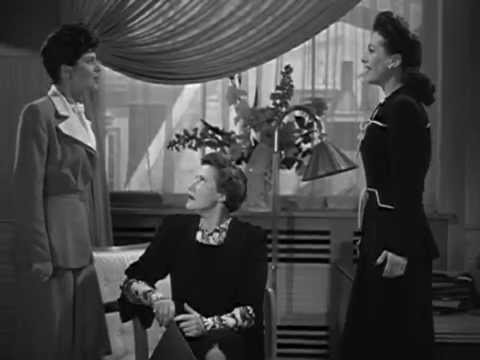
Crawford’s character eats humble pie. Image: YouTube
Without Dorn’s protection, Crawford discovers how unsafe Paris actually is. But we know she’s a gal with gritty resolve: She seduces a Nazi officer, shelters an American pilot, and fakes respect when serving Nazi wives at the dress shop.
Something about her performance makes us realize there have been many women, in many wars, who do these very things to protect themselves and their families.
Reunion in France is a rare film because it passes the Bechdel Test and reminds us that wars claim far more casualties than official statistics would have us believe. It’s also one of the last films Joan Crawford made for MGM, during a time when her career was faltering.
But Crawford was nothing if not professional, and we urge you to see her stellar performance in this lesser-known film.
Reunion in France: Joan Crawford, John Wayne, Philip Dorn. Directed by Jules Dassin. Written by Jan Lustig, Marvin Borowsky, Marc Connelly. Metro-Goldwyn-Mayer, 1942, B&W, 104 mins.
This post is part of The Joan Crawford Blogathon hosted by In the Good Old Days of Classic Hollywood. Click HERE to see today’s fab entries.



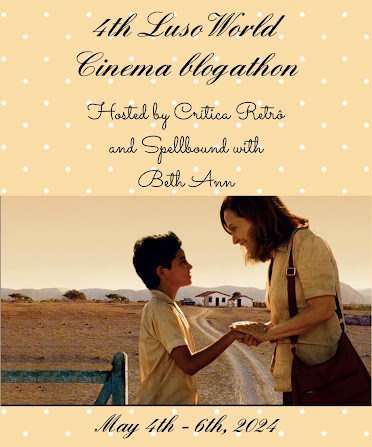

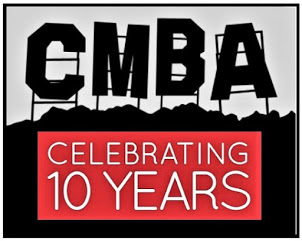


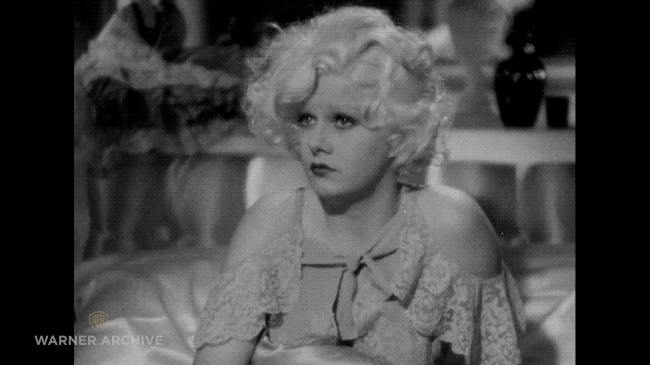





You had me at the headline! “Starring Joan Crawford, as France”! Awesome! 🙂
LikeLiked by 1 person
Ha! Thanks! Have you seen this film? It’s worth a look.
LikeLike
For some reason, I’m having trouble imagining Joan Crawford and John Wayne in the same movie, but the unique perspective on the occupation sounds fascinating. Especially in how you wrote that it reminds us of the non-quantifiable costs of war…and about Joan Crawford’s performance.
LikeLiked by 2 people
I know what you mean, but Crawford and Wayne make a surprisingly good screen couple. It’s almost as if John Wayne knew it was Crawford’s film and let her have it.
I hope you get a chance to see it. I’d be really interested in your thoughts.
LikeLiked by 1 person
Strange, I had no idea the two starred in a movie together. Will have to try and catch this one.
LikeLiked by 1 person
Yes, it’s surprising to see Joan Crawford and John Wayne on screen together, but I think it works well. John Wayne doesn’t try to crowd Joan’s spotlight – he lets her bask in the glow.
LikeLiked by 1 person
I LOVE this movie and have devoted much time & energy to urging people to watch it. It just works. As you say, Crawford is EXCELLENT in it. It reminds me of another great film about Occupied France, JOAN OF PARIS. Thanks for this and for keeping it spoiler-free as well
LikeLiked by 1 person
Now, “Joan of Paris” is a film I’ve yet to see.
I’m glad you encourage others to watch “Reunion in France”. It really is a terrific film, and Joan Crawford is superb. Thanks for dropping by! 🙂
LikeLike
Well, it’d take a star like Joan to play a whole nation! Seriously, I was totally unfamiliar with this film, so your post made for an interesting read.
LikeLiked by 1 person
Haha! Joan is the perfect person to play France. This film is really worth it. I hope you get a chance to see it. 🙂
LikeLike
The fact that this is a movie about war as seen through a woman’s eyes sounds very interesting to me. I liked your title about Joan Crawford starring as France. It made me do a double take when I first saw it, I thought I had read it incorrectly. 🙂 It sounds like she goes through a big change in attitude during the coarse of the movie. I’m putting this one on my list. Thank you, Ruth!
LikeLike
Shari, I think you’d like this one. It’s an interesting story, with some fabulous gowns, but it also has a lot of meaning about freedom and tyranny. It’s really worth a watch.
LikeLike
I saw this one recently and enjoyed it – great performance by Crawford and I also liked Wayne in a slightly surprising role for him. It hadn’t struck me (or I hadn’t remembered) that Crawford’s character was supposed to represent France. Great review.
LikeLiked by 1 person
John Wayne’s role is rather unexpected, isn’t it? But his scenes with Crawford are quite good. I didn’t get the sense that he was trying to upstage her, which was kind of a relief. I’m glad you’d already seen this film & enjoyed it. 🙂
LikeLiked by 1 person
I own this film on DVD, but haven’t seen it yet. I hope I can see it with my grandparents – who would watch John Wayne in prctically anything. I’ll look for this moment and certainly will enjoy the film more after reading this post!
Don’t forget to read my contribution to the blogathon! 🙂
Kisses!
Le
LikeLiked by 1 person
I hope you get the chance to watch this with your grandparents. It would be interesting to see what each of you think of it. John Wayne doesn’t have as much screen time as Joan Crawford, but he’s still wonderful – and he plays a crucial role.
LikeLike
I have a difficult time watching any WWII films, to be honest. This is a stunning review, though, and I might have to check it out.
LikeLiked by 1 person
I really like this film, but I can see why a person may not want to watch it. Some scenes make a person feel angry about the nature of military occupation.
LikeLiked by 1 person
It’s WWII in particular that I find difficult but the focus of this film seems bearable/interesting.
LikeLiked by 1 person
I’ve never seen this movie but it sounds fascinating that it was shot just two years after the actual invasion happened. It must have been a shock to period viewers to see the horror they’ve just experienced on the big screen so soon afterwards. I don’t think there’re enough films made on current events nowadays since it gives everything a different perspective than a historical movie could ever do – even though we’re lucky enough that there’re no horrible things such as WWII going on.
LikeLiked by 1 person
Yes, we’re lucky we’re not involved in a gruesome global conflict like WWII was. I agree – this film, made so soon after the German invasion of France, must have resonated deeply with audiences.
LikeLike
I can almost see Joan’s eyes widen as she read the script and noted, correctly, that she’d be playing France and not some tiny country like Holland or Belgium. France!
I’ve not seen this film, Ruth, and to be honest, probably would have passed it by once I saw the Duke was a cast member. Thanks to your review,however, I’ll be sure to catch this one. Netflix must love you. 🙂
LikeLiked by 1 person
Perfect!! I can just see Joan now, based on your vivid description.
John Wayne doesn’t have a lot of screen time in this film – it’s All About Joan. But Joan can carry this movie. It needs a strong personality like hers. I hope you get a chance to see it!
LikeLiked by 1 person
A slightly different tack from my own review. (just finally getting around to some of these, I’ve been busy…) Interesting.
LikeLike
Thanks for dropping by! 🙂
LikeLike